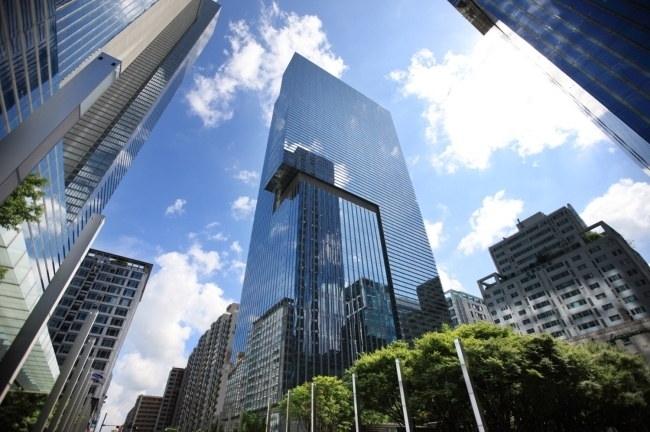
Samsung headquarters in Gangnam district, Seoul, where the group's financial arms such as Samsung Life Insurance, Samsung Fire & Marine Insurance, Samsung Securities and Samsung Asset Management are currently located. The affiliates are poised to relocate as the group's real estate redevelopment plan in central business district is complete. (Samsung Group)
South Korea is expected to witness a decentralization of the office market in its capital city Seoul over the next few years as major tenants are planning to relocate and new submarkets emerge, a report showed Monday.
Chaebol tenants such as Samsung, Doosan, Hyundai Heavy, LG are planning relocations within the Greater Seoul area, while banking group Hana Financial Group and public institutions are considering moving out of Seoul, leading to a “great reshuffling” of the Seoul office market, according to a report by commercial real estate services company Colliers International Korea.
For example, Samsung‘s financial affiliates located in the Gangnam area is expected to relocate as the group’s Seosomun Building redevelopment plan in central business district is complete. The Seosomun building, formerly known as the Joongang Ilbo Building, is owned by one of the affiliates Samsung Life Insurance.
Hana Financial Group, currently located in the central area, is also poised to move to the port city Incheon by 2023 under a groupwide consolidation plan.
Meanwhile, Bundang -- a city adjacent to southern border of Seoul -- is eyeing new tenants such as Doosan Heavy Industries & Construction and Hyundai Heavy Industries. The city is already home to Hankook Technology Group, which operates Hankook Tire, as it moved from Gangnam in May. Also, more LG affiliates including LG Chem are poised to move to Magok, a district in western Seoul.
As a result, Bundang and Magok will emerge as the new submarkets in the Greater Seoul area, according to the report.
“The three major submarkets traditionally have an industry focus: finance in the central business district, IT in the Gangnam and securities companies in Yeouido,” Judy Jang, associate director of Colliers International Korea, wrote in the report.
“Recently, these clusters have become less defined as benefits to a central area and Yeouido location begin to outpace the Gangnam area. Also, a supply shortage in Gangnam continues to drive tenants to other submarkets.”
The anticipated move comes along with relocation of public institutions to suburbs, which could cut the proportion of public institutions located within the Seoul metropolitan area to 35 percent, from 85 percent as of June.
Moreover, the demand for flexible workspace and the spread of satellite offices will continue to grow amid the pandemic, the report added.
By Son Ji-hyoung (
consnow@heraldcorp.com)

![[Exclusive] Korean military set to ban iPhones over 'security' concerns](http://res.heraldm.com/phpwas/restmb_idxmake.php?idx=645&simg=/content/image/2024/04/23/20240423050599_0.jpg&u=20240423183955)

![[Graphic News] 77% of young Koreans still financially dependent](http://res.heraldm.com/phpwas/restmb_idxmake.php?idx=645&simg=/content/image/2024/04/22/20240422050762_0.gif&u=)


